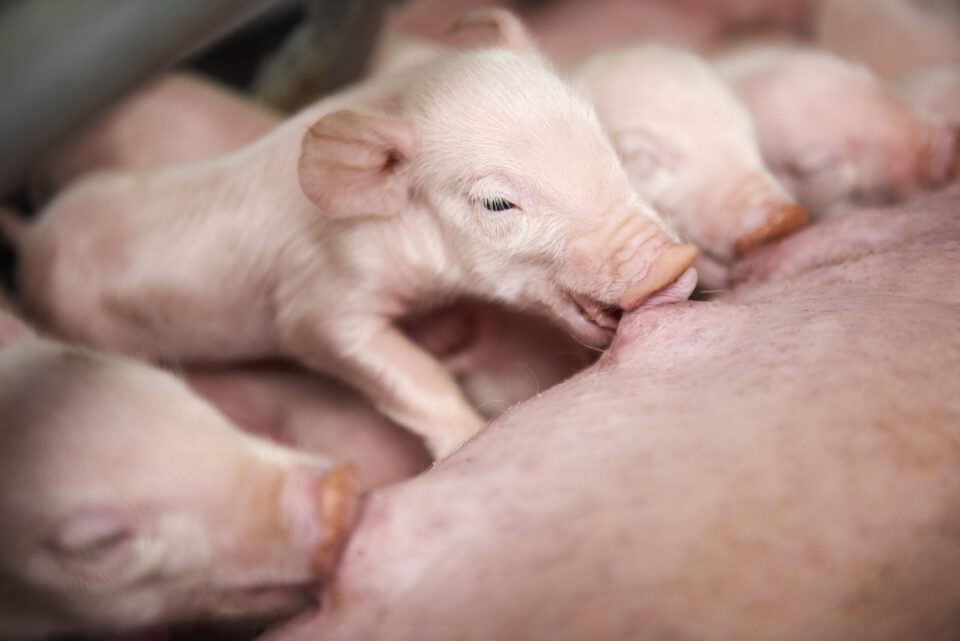A new genetic approach has led to a ground-breaking change in the breeding goals for DanBred genetics, which will contribute to increased piglet survival and more weaned pigs – through an increased focus on robustness. One extra pig at weaning through increased piglet survival provides an economic value of EUR 1.28 per finisher pig for the farmer. This helps us secure our spot as the number one choice for future pig producers.
This improvement of the breeding goal has led to three new traits being included in the breeding work: the piglet’s own genetic potential to survive, the sow’s genetic potential for making its piglets survive, and litter size – which is the number of piglets born. The new breeding goals will contribute to a greater financial gain for you as a pig producer, as more piglets are alive at weaning. But what exactly is the economic value of increased piglet survival?
Maximum profit for the pig producer
Over the past century, DanBred has developed a balanced breeding programme that strives to improve animal welfare, sustainability, and profit for everyone using DanBred genetics. Therefore, the breeding goal is updated regularly to ensure that it stays up to date in a changeable industry. The changes are decided by actual pig producers, who are on the board of the Danish Agriculture & Food Council, Sector for Pig.
This change in the breeding goal involves three new traits that will improve the robustness of the piglets as well as the maternal traits of the sows, which will contribute positively to the existing productivity from birth to slaughter. The approach is unique because it also includes the piglets’ own genetic potential, instead of just looking at the genetic potential of the sows.
Higher piglet survival
The ground-breaking change in the breeding goals will increase the number of weaned pigs per sow through increased piglet survival and a continued focus on the robustness of both sows and piglets. It is expected that the new breeding goals can increase piglet survival significantly.
It also means a boost for the general animal welfare, as it will cause higher survival rates, fewer disease treatments, and increased well-being. This results in both a more sustainable production and a higher financial profit for you as a pig producer.
But how much value is there?
“From an economic point of view, the goal of the new breeding goal is to get more pigs to weaning, and, thus, also all the way to slaughter. We can achieve this by either increasing piglet survival or increasing litter size at birth,” says Tage Ostersen, Head of Department at Breeding & Genetics at the Danish Agriculture & Food Council.
Therefore, it has been calculated which of these two traits that has the greatest economic value. The outcome of the two approaches is as follows:
- The economic value of getting one extra pig at weaning through increased litter size at birth is EUR 1.06 per slaughter pig.
- Meanwhile, the economic value of getting one extra pig at weaning through increased piglet survival is EUR 1.28 per slaughter pig.
Thus, there is an added value of EUR 0.22 per finisher when weaning through increased piglet survival, as in the new breeding goal, compared to litter size.
Genetics and breeding cannot do it alone
“Through breeding, we can move the pig’s genetic level and select the best pigs for future generations. In the breeding goal, we consider both the sow’s genetic potential to make its piglets survive, as well as the piglet’s genetic potential to survive, which will increase survival among the piglets,” explains Tage Ostersen.
But breeding cannot – and should not – stand alone when talking about piglet survival and survival in general. It is alpha and omega that the management around the pigs are also under control, and that the good routines around management continue to be further developed, as these are also crucial factors for survival.
Even better feed efficiency and higher daily growth
The new breeding goals will build on the world-class results for finisher traits that DanBred has already achieved, and this means a further development of feed efficiency and even higher daily gain. This not only reduces the number of days until slaughter, but also the total feed consumption: “We will continue to improve the breeding goals with the aim of creating more output with less input,” says Claus Fertin, CEO of DanBred.
The interest of the farmers is always the key focus when it comes to the development of our breeding programme. And by strengthening our work to improve robustness and productivity traits, we are once again emphasising our commitment to continue delivering the highest quality and profit to you – and the industry’s lowest cost per kg of meat produced.



